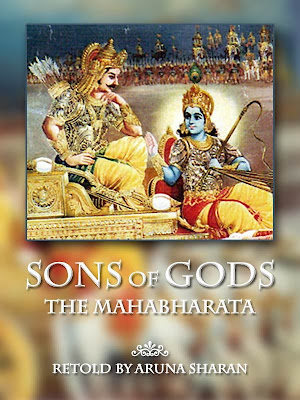Myths of Mankind: The Mahabharata Part Three
Archaeology (con'd) and Hinduism

"The quintessence of India, her religion, has remained unchanged ever since the great poem was composed. No invader or coloniser was ever able to overcome it, and indeed many, like the Aryan invaders form the north, were overcome by it, absorbed into its generous complexities.
"The root of Hinduism is not just in the belief in one God, like the monotheism of Christians and Moslems, but that there is nothing in existence besides this One God. God is not only in everything and everyone, he literally is everything. For, asks the Mahabharata, is the drop of rain in essence any different from the vast ocean into which it falls and vanishes? If God is all he is in us, and we are he. Man's quest, therefore, is for the divine within to become part of all, part of God.

"The quintessence of India, her religion, has remained unchanged ever since the great poem was composed. No invader or coloniser was ever able to overcome it, and indeed many, like the Aryan invaders form the north, were overcome by it, absorbed into its generous complexities.
"Jews were here since the times of king Solomon. India has the distinction of being the only country on earth where they were never persecuted. Almost every religions faith of the world was represented, like Islam in huge numbers, Christians numbering millions; and out of Hinduism have come reforms, movements like Buddhism that became major religions in their own right. But the Indian soul was never been conquered. Vedas and Mahabharata spring from an ancient and enduring civilisation, the scope of which we are only now beginning to fathom."
"The root of Hinduism is not just in the belief in one God, like the monotheism of Christians and Moslems, but that there is nothing in existence besides this One God. God is not only in everything and everyone, he literally is everything. For, asks the Mahabharata, is the drop of rain in essence any different from the vast ocean into which it falls and vanishes? If God is all he is in us, and we are he. Man's quest, therefore, is for the divine within to become part of all, part of God.
"At its core (Hinduism) is more of a philosophy than what we in the West would call a religion. It was out of this philosophy, too austere, intellectually taxing for most, that was born the bewildering diversity of India’s estimated 26 million gods and goddesses.



Comments